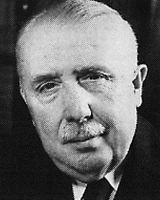
Adolf Eduard von Steiger was a Swiss lawyer and politician who served as the 51st President of the Swiss Confederation twice in 1945 and 1951 for Party of Farmers, Traders and Independents. Von Steiger served as a Member of the Federal Council (Switzerland) from 1941 to 1951 and previously on the Grand Council of Bern from 1914 to 1939.

The canton of Bern, or Berne, is one of the 26 cantons forming the Swiss Confederation. Its capital city, Bern, is also the de facto capital of Switzerland. The bear is the heraldic symbol of the canton, displayed on a red-yellow background.

Christoph Wolfram Blocher is a Swiss industrialist and politician who served as a Member of the Swiss Federal Council from 2004 to 2007. A member of the Swiss People's Party (SVP/UDC), he headed the Federal Department of Justice and Police. As an industrialist, he became wealthy as CEO and majority shareholder in the EMS-Chemie corporation, now run by his daughter, Magdalena Martullo-Blocher.

The Freedom Party of Switzerland (FPS) is a minor right-wing populist political party in Switzerland. Its president and leading representative is Jürg Scherrer, formerly the head of the security department in the city government of Biel/Bienne until 2008. The party is against much government involvement in the economy, especially environmental regulations, but is for strict controls on immigration and strict punishments for selling drugs. The party opposes Swiss EU membership.

Biel/Bienne is a bilingual city in the canton of Bern in Switzerland. With over 55,000 residents, it is the country's tenth-largest city by population. The Biel urban area has a population of around 100,000 inhabitants. Biel/Bienne is the capital of the Biel/Bienne administrative district. The city has been an industrial and watchmaking heart of Switzerland since the 19th century. With world-famous watch brands such as Rolex, Omega and Swatch based in Biel/Bienne, the city is one of the main centres of the Swiss watch industry and is also referred to as the "world capital of watchmaking".
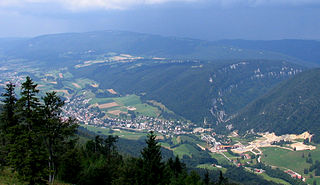
Bernese Jura is the name for the French-speaking area of the Swiss canton of Bern, and from 2010 one of ten administrative divisions of the canton.

The Grand Council is the parliament of the Swiss canton of Bern.
Switzerland has a two-class highway system: motorways with separated roads for oncoming traffic and a standard maximal speed limit of 120 kilometres per hour (75 mph), and expressways often with oncoming traffic and a standard maximal speed limit of 100 kilometres per hour (62 mph).

Seeland is a region in Switzerland, at the south-eastern foot of the mountain range of the Jura Mountains containing the 3 Lakes of Morat, Neuchâtel, and Bienne (Biel). In previous eras, it was the floodplain of the Aare and was thus swampy. After the huge hydrological works Jura water correction, the area drained out and could support more cultivation. Seeland is one of the most important regions in Switzerland for growing vegetables, particularly in the Grand Marais.
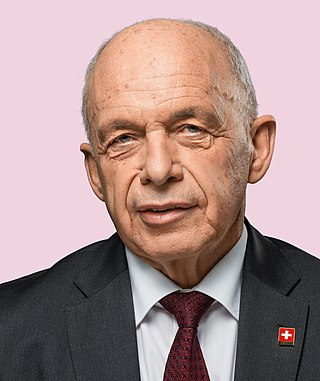
Ulrich "Ueli" Maurer is a Swiss politician who served as a Member of the Swiss Federal Council from 2009 to 2022. A member of the Swiss People's Party (SVP/UDC), he was President of the Swiss Confederation in 2013 and 2019. Formerly head of the Federal Department of Defence, Civil Protection and Sports (2009–2015), Maurer has headed the Federal Department of Finance from 2016 to 2022. From 2019 to 2022, he was the longest-serving sitting member of the Federal Council.

The Geneva Citizens' Movement, abbreviated to MCG, is a right-wing populist political party in the Canton of Geneva, Switzerland. On its own initiative, it started, and is a part of, the wider Romandy Citizens' Movement, abbreviated to MCR.

Denis Simonet a.k.a. "SciFi" from Ipsach is a Swiss politician, and was the first president of the Pirate Party Switzerland (PPS). In April 2012 he was elected as a board member of Pirate Parties International. He also is the chairman of the court of arbitration of PPS and the spokesman of his party.

Johann Niklaus Schneider, known as Johann Schneider-Ammann, is a Swiss businessman and politician who served as a Member of the Swiss Federal Council from 2010 to 2018. A member of FDP. The Liberals, he was President of the Swiss Confederation in 2016. During his tenure as a federal councillor, Schneider-Ammann headed the Federal Department of Economic Affairs, Education and Research.

Federal elections were held in Switzerland on 18 October 2015 for the National Council and the first round of elections to the Council of States, with runoff elections to the Council of States being held in various cantons until 22 November.

Guy Bernard Parmelin is a Swiss Federal Councillor and head of the Department of Economic Affairs, Education and Research. A member of the Swiss People's Party (SVP/UDC), he has been a member of the Federal Council since 2016, and has led the Department of Economic Affairs, Education and Research since 2019. He previously led the Department of Defence, Civil Protection and Sports between 2016 and 2018. He served as president of Switzerland in 2021, having previously served as vice president of Switzerland in 2020.

Regula Rytz is a Swiss historian and politician who served on the National Council (Switzerland) for the Green Party from 2011 to 2022. She concurrently served as co-president of the Green Party of Switzerland from 2012 to 2016 and as president from 2016 to 2020.
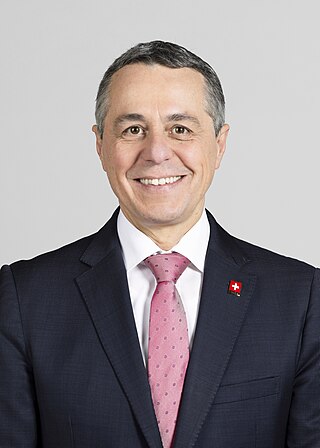
Ignazio Daniele Giovanni Cassis is a Swiss physician and politician who has been a Member of the Swiss Federal Council since 1 November 2017. A member of FDP.The Liberals, Cassis was elected to the Federal Council on 20 September 2017 following the resignation of Didier Burkhalter. He has headed the Federal Department of Foreign Affairs since he took office. On 8 December 2021, Cassis was elected President of the Swiss Confederation for 2022.
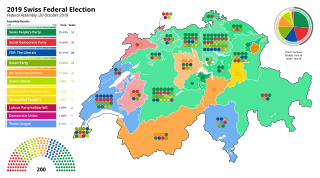
Federal elections were held in Switzerland on 20 October 2019 to elect all members of both houses of the Federal Assembly. This was followed by the 2019 election to the Swiss Federal Council, the federal executive, by the United Federal Assembly.

Liselotte Spreng was a Swiss women's rights activist and politician. She was the first female National Councillor from the canton of Fribourg.

Ernst Leuenberger was a Swiss trade unionist and politician. He was a member of the National Council from 1983 to 1999, serving as president of the council in 1998, and a member of the Council of States from 1999 to 2009. He was a member of the Social Democratic Party of Switzerland.



















